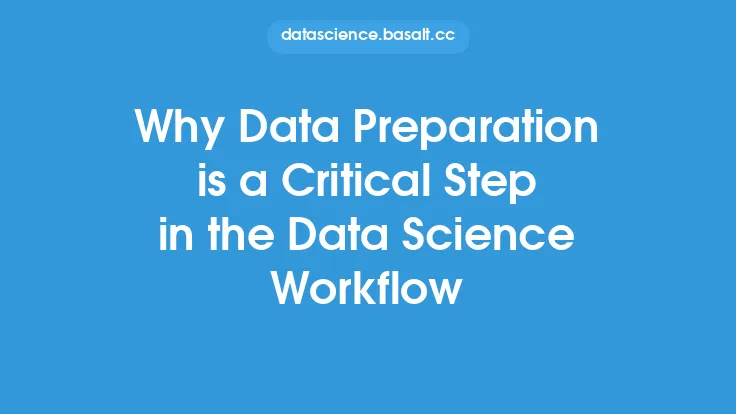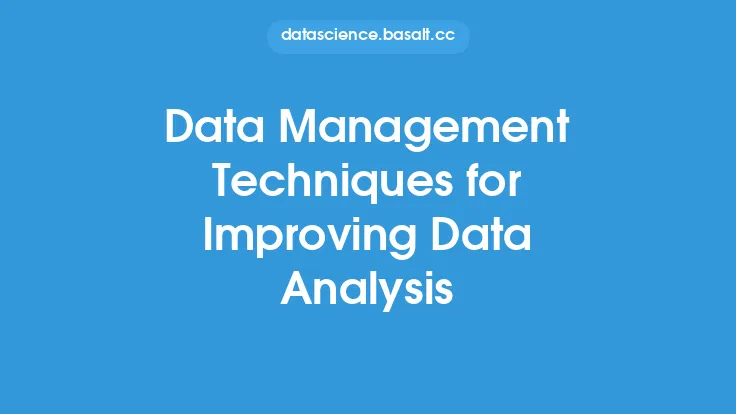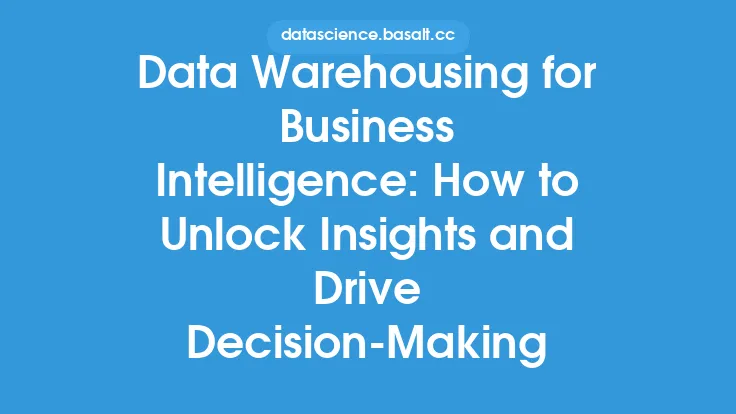In today's fast-paced, data-driven business landscape, organizations are constantly seeking ways to gain a competitive edge and make informed decisions. At the heart of this pursuit lies data management, a critical component of any successful business strategy. Effective data management enables companies to collect, store, organize, and analyze their data in a way that supports their overall goals and objectives. Without a robust data management system in place, businesses risk being overwhelmed by the sheer volume and complexity of their data, leading to missed opportunities, poor decision-making, and ultimately, decreased profitability.
Introduction to Data Management
Data management refers to the process of planning, organizing, and controlling the data resources of an organization. It involves a range of activities, including data governance, data quality, data security, and data analytics. The primary goal of data management is to ensure that an organization's data is accurate, reliable, and accessible, and that it can be used to support business decision-making and drive growth. Effective data management requires a deep understanding of an organization's data assets, as well as the ability to design and implement systems and processes that support the collection, storage, and analysis of those assets.
The Benefits of Effective Data Management
So, why is data management so critical for business success? The benefits of effective data management are numerous and far-reaching. For one, it enables organizations to make better decisions, faster. By providing access to accurate and timely data, data management systems support the development of data-driven business strategies, which are more likely to succeed than those based on intuition or guesswork. Effective data management also improves operational efficiency, by automating manual processes and reducing the risk of data errors. Additionally, it enhances customer satisfaction, by providing a single, unified view of customer interactions and preferences. Finally, effective data management supports regulatory compliance, by ensuring that an organization's data is handled and stored in accordance with relevant laws and regulations.
Data Management Challenges
Despite the many benefits of effective data management, organizations often face significant challenges in implementing and maintaining a robust data management system. One of the most common challenges is data complexity, which arises from the sheer volume and variety of data that organizations must manage. This can include structured data, such as customer information and transactional data, as well as unstructured data, such as social media posts and email messages. Another challenge is data siloing, which occurs when different departments or teams within an organization have their own separate data systems, making it difficult to share data and collaborate. Data security is also a major concern, as organizations must protect their data from cyber threats and other forms of unauthorized access.
Data Management Technologies
A range of technologies are available to support data management, including data warehouses, data lakes, and data governance platforms. Data warehouses are centralized repositories that store data from various sources, making it easier to access and analyze. Data lakes, on the other hand, are decentralized repositories that store raw, unprocessed data, which can be used to support big data analytics and other advanced analytics applications. Data governance platforms provide a framework for managing data across an organization, including data quality, data security, and data compliance. Other technologies, such as cloud computing, artificial intelligence, and machine learning, are also being used to support data management, by providing greater scalability, flexibility, and automation.
Best Practices for Data Management
To get the most out of their data management systems, organizations should follow a number of best practices. First, they should develop a clear data management strategy, which aligns with their overall business goals and objectives. This strategy should include a data governance framework, which outlines the policies and procedures for managing data across the organization. Organizations should also invest in data quality, by implementing processes and technologies that ensure data accuracy, completeness, and consistency. Additionally, they should prioritize data security, by implementing robust security measures, such as encryption, access controls, and authentication. Finally, organizations should continuously monitor and evaluate their data management systems, to ensure that they are meeting their needs and supporting their business objectives.
The Future of Data Management
As the business landscape continues to evolve, the importance of data management will only continue to grow. In the future, we can expect to see even more emphasis on cloud-based data management, as well as the use of artificial intelligence and machine learning to support data analytics and decision-making. The Internet of Things (IoT) will also play a major role, as more and more devices become connected and generate vast amounts of data. To stay ahead of the curve, organizations will need to be agile and adaptable, with the ability to quickly respond to changing business needs and market conditions. By investing in robust data management systems and following best practices, organizations can position themselves for success, both now and in the future.
Conclusion
In conclusion, data management is a critical component of any successful business strategy. By providing a framework for collecting, storing, organizing, and analyzing data, data management systems support business decision-making, drive growth, and improve operational efficiency. While there are challenges to implementing and maintaining a robust data management system, the benefits are well worth the effort. By following best practices, investing in the right technologies, and staying ahead of the curve, organizations can unlock the full potential of their data and achieve their business objectives. Whether you're a seasoned data management professional or just starting out, one thing is clear: data management is essential for business success, and it will only continue to grow in importance in the years to come.





